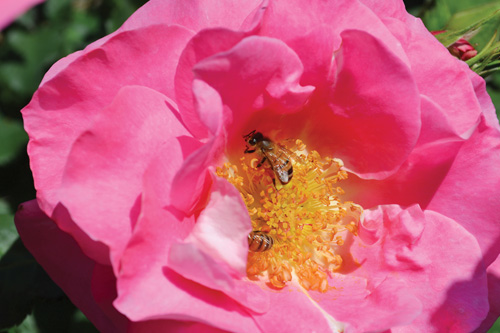The weather is warm, flowers are blooming and the buzz around the county is coming from bees that have been collecting nectar and pollen all spring to make honey.
Known to experts as Apis Mellifera, the honeybee is a vital pollinator in our food chain and is the only insect that produces a product consumed by man. So this summer, don’t shoo away the productive little pollinators but rather find ways to help promote them.
What to plant to attract bees
For those that don’t want to go as far as becoming a bee keeper but are interested in creating a prosperous environment for honeybees can plant certain species in their yard that will help attract and feed them. According to the experts at The Melissa Garden, a bee sanctuary off of Westside Road in Healdsburg, over 75 percent of plants require pollination by bees, insects and birds. Honeybees benefit from feeding on a variety of flowers, annuals, perennials and shrubs grown without the use of pesticides. Some of the most common plants for our area include, Bush Sunflowers, California Gilia and Wild Lilac. All of these flowers create both pollen (protein) and nectar (carbohydrates) that attract honeybees. There are many other plants that attract bees for either pollen or nectar including vegetable and herbs such as basil, mint, oregano, zucchini and tomatoes. Bees need a pound of pollen per week per hive and fly around 2- to 3 miles to collect it.
What to do if you see a swarm
When trekking around in the outdoors or tearing down old buildings or trees, the potential for stumbling across a swarm of bees increases. Whether or not the swarm is located on your property, do not approach the hive, do not spray it with anything or make motions to disturb it. Leave it bee. There are experts that will help extract and relocate the colony. The Sonoma County Beekeepers’ Association has an entire directory of swarm collectors that you can call as soon as you spot a swarm.
“What people need to know is don’t kill them, there are so many bee keepers in Sonoma County now, you can call and that person will show up and take them away,” said Bill Sirvatka, listed as Billy Bee Good on the swarm call list through SCAB.
Swarm season usually runs from March until May when the queen bee and worker bees are looking for a place to relocate. Come summer, most swarms have found a new hive and honey can be collected from established hives.
Bee products
The rumor around town is that local honey can help alleviate suffering from allergies. Usually this homeopathic method only works if you are allergic to pollen. Want to give it a try? Beekind in Sebastopol carries a wide array of honey products along with beeswax candles and bee keeping supplies.
Owners Doug and Katia Vincent started Beekind in 2004 after tending to hives and joining the beekeepers association. Now the couple has over 100 hives around the county and creates products beyond your typical jar of honey.
“We had more and more bees every year and had honey all over the house and we sold on the side of the road with people stopping to buy honey for their allergies and then we thought there should be a place people can go everyday to buy local honey,” Doug said.
The shop, on the south side of town on Hwy. 116, offers a honey tasting bar and for those interested in beekeeping, you may want to introduce yourself to Doug while visiting, he can tell you more than you will ever believe there is to know about bees.
Whether taking on beekeeping as a hobby or a career, you can also check out classes at the shop location. Classes in the month of June will offer information on both hive management and extracting honey. Sign up now before they fill up and then take a break until fall.
“There is a learning curve, and it takes a few years, they are not pets even though people often treat them like they are. The costs with bees are upfront. You invest in the equipment, suit and bees, then you can divide your hive or catch wild swarms,” Doug said.
How to get involved
The Sonoma County Beekeepers’ Association (SCBA) has pages of information online and contacts for anyone interested in volunteering, starting a hive, buying bees, how to report a swarm, and what to plant for bees. For those that are just now dipping a finger in the honey and aren’t sure if beekeeping is for them, attend an informational meeting through SCBA, held on the second Monday of every month at the Sonoma County 4-H Facility.
“The meetings are great for getting started, they are free to attend and you don’t have to be a member to come by,” said SCBA board member Rita Maloney.
The SCBA has over 300 members, the fee for becoming a member is $25 a year including access to books and materials about beekeeping.
“It is a great way to start learning about bees,” Maloney said noting that beekeeping is not an inexpensive hobby and that she studied for a year before getting her first hive.
Regional meetings are also available to members and a good way for first time beekeepers to meet “bee buddies” to help them along the way.









